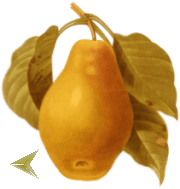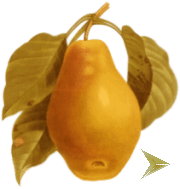

Of Praying
to Our Lady
by F.J. Sheed
and
In October,
A Poem
by G.K. Chesterton
Of Praying
to Our Lady
by F.J. Sheed
THE CATHOLIC PRAYS to Our Lady, but not as he prays to God. Following the four-fold division of prayer, we can see the difference.
Adoration-----which for the Christian is a compound of supreme homage, supreme love-----is for God alone as the Infinite Being upon Whom all things and all persons [including Our Lady] depend. But all God's works are good with the goodness He has given them and we honour Him by honouring them: the more goodness He has given them, the better they mirror His Own infinite perfection, the more honour, veneration, we give them. Our Lady is His master-work: we honour her more than any other of the creatures of God: and we tell her so. God loves her more than He loves any other creature He has made-----because she has more goodness in her, because she loves Him better. God loves her more; so do we, and we tell her that, too.
Thanksgiving-----all good gifts are from God. We thank Him primarily. But, under God, human beings can give us good gifts too. We thank them secondarily. No creature ever gave us so good a gift as the Virgin who gave us Christ: whenever we remember that gift, we remember our gratitude to her: it would be churlish not to tell her so. We do tell her so. There are other gifts from her to us, as we shall see in a moment. We thank her for those too.
Sorrow for Sin-----we confess our sinfulness to God, for it is only because sins offend Him that they are sins, and it is only He Who can forgive them. But we confess our sinfulness to Our Lady too. Why? Because our sins caused the bitter suffering of her Son on the Cross. There is another reason. Listen to the Confiteor, as the priest says it at Mass:
I confess to Almighty God, to Blessed Mary Ever-Virgin, Blessed Michael the Archangel, Blessed John the Baptist, the holy Apostles Peter and Paul, all the Saints and you, brethren, that I have sinned exceedingly in thought, word and deed, through my fault, through my fault, through my most grievous fault.
Once we have confessed to God, as we do in the first clause, what is the point of confessing to those others? The Confiteor concludes:
Therefore I beseech the Blessed Mary Ever-Virgin, Blessed Michael the Archangel, Blessed John the Baptist, the holy Apostles Peter and Paul, all the Saints and you brethren, to pray to the Lord our God for me.
Petition-----only God can forgive our sins. Only God can give us any good, spiritual or material. But God will give them to one person because another has asked Him to. So we ask Our Lady to pray to God that we may not be destroyed by our sins-----and we ask not only Our Lady but Michael and John and Peter and Paul and all the Saints: and not only all the Saints but all the sinners too-----everyone can pray for others: everyone's prayer can profit others.
We know this by one totally conclusive fact-----that when Our Lord gave us the prayer that was to be the model of all prayers, He put it in the plural: not "give me this day my daily bread, forgive me my trespasses . . . deliver me from evil," but give us, forgive us, deliver us. By Our Lord's instruction, a man prays for bread, forgiveness, deliverance, not for himself only but for others. Therefore [to put it mathematically] one man's prayer may help others to obtain material and spiritual good. Therefore we ask others to pray for us. So did St. Paul. For instance, he asked his converts to pray for him-----that he might be delivered from importunate and evil men [2 Thess. iii, 1]. Nor does this take anything from the one mediatorship of Christ. Indeed St. Paul [1 Tim. ii] uses the fact that "there is one mediator between God and man, the man Christ Jesus" as a reason why we should pray for one another: because man and God are thus linked by Christ, man's prayers can avail with God.
There is an organic principle involved. Christians are members of one body, the Mystical Body of Christ, and the strength of one can avail for the weakness of another. On a lesser but still real level all men are linked in the brotherhood of the human race. In showing us that we are to pray for one another and seek one another's prayers. God is reminding us of that double solidarity.
The
last word hardly needs saying. If any person's prayers have power with
God, Our Lady's have -----for
she is the holiest of God's creatures
and so the most pleasing to God: and she is the Mother of all men and
so
most ready to come to men's aid.
 In
October
In
October 
by G.K. Chesterton
WHERE ARE they gone
that did delight in honour
Abrupt and absolute
as an epic ends,
What light of the Last
Things, like death at morning,
Crowns the true lovers
and the tragic friends?
Young priests with eager
faces bright as eagles,
Poor scholars of the
harp-string, strict and strong,
All the huge thirst
of things irrevocable
And all the intolerant
innocence that died young.
The dark largesse of
the last gesture flinging
The glove in challenge
or gold in sacrifice-----
Where are they gone
that had delight in honour,
That the world grows
so greedy and so wise?
Vow and averted head
and high refusal
Clean as the chasm
where the dawn burns white,
Where shall they go
that have delight in honour
When all men honour
nothing but delight?
Out of the infinite
came Finality,
Freedom that makes
unfathomably sure,
For only a wind of
all the widest windows
Can close with such
a clang that iron door:
The doors that cannot
shut shall never open
Nor men make windows
when they make not walls,
Though emptiness extend
its endless prison
In the white nightmare
of its lengthening halls.
Shall they not rise
and seek beyond the mountains
That which unsays not
and is not forsworn?
Where should they wander
and in what other Eden
Find the lost happiness
of the hope forlorn,
Look in what other face
for understanding,
But hers who bore the
Child that brought the Sword,
Hang in what other
house, trophy and tribute,
The broken heart and
the unbroken word?
This month of luminous
and golden ruin
Lit long ago the galleys
and the guns.
Here is there nothing
but such loitering rhyme
As down the blank of
barren paper runs,
Light in the laurels, sunrise of the dead,
Wind of the ships and lightning of Lepanto,
In honour of Thee, to whom all honour is fled.
DOWNLOAD THE IMAGE PLAIN
 Contact Us
Contact Us
HOME--------BACK TO BELLOC-CHESTERTON
www.catholictradition.org/Mary/october.htm